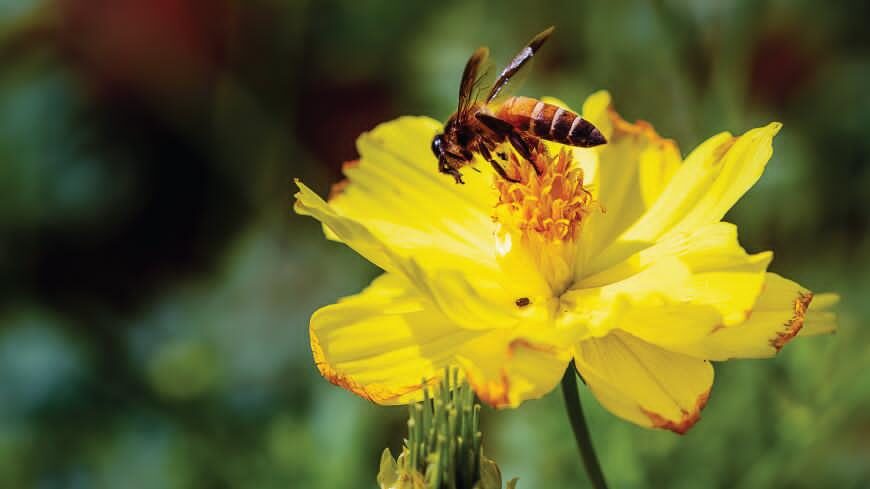What is an ecosystem
All living organisms and non-living matter interacting in a given environment is called an ecosystem.

Our planet is made up of a constant interaction between living and non-living factors that influence each other, forming a self-sufficient system in dynamic and continuous equilibrium.
The non-functioning of one of these interacting factors could cause devastating damage to the entire planet, upsetting the balances and mechanisms that characterize each habitat and allow the survival of each species.
Bees: an indispensable factor
As in a puzzle so in nature each piece fits into another and creates a dense and solid net that leads to permanent stability.
Bees are precisely one of these fundamental building blocks for the functioning of our entire planet. All living species including the human species need the work of bees to receive what nature and plants produce.
Food produced from the earth is a source of sustenance for animals but also for us humans. It is estimated that without bees, a large slice of the food available to us would disappear completely.
Globally, the presence of bees plays a decisive role for the future development of the planet.
How bees act
Bees have been responsible for a mechanism that has distinguished our planet for millions of years and without which the continuous advancement of productivity by the land would not be possible.
This very important phenomenon is called pollination.
Pollination is at the heart of how the Earth works. It is through this process that plants exchange their pollen and give birth to new shoots and thus new fruits and new sources of nourishment.
Speaking in more scientific terms, pollination is the transport of pollen from the male to the female part of the reproductive system (contained in cones or flowers) of the same or different plants. It represents the main mechanism of reproduction of Gymnosperms and Angiosperms.
The transfer of pollen from one flower to another is only possible, however, thanks to special insects called "pollinating insects" of which bees are part.
Moving from one flower to another for the research of the nectar, in fact, the bees provide the natural exchange of pollen between the flowers, thus allowing also their fecundation.
Bees, however, have been declining considerably in recent years. This has given rise to considerable concern on the part of the experts who have decided to implement protective measures against bees.
If within a few decades the bees were to become extinct, our planet would begin to have a series of chain collapses due to lack of food.
In addition to the protection of these animals, man has tried to study other methods to preserve the future of our planet.
One of the alternatives is artificial pollination (also called manual or mechanical pollination) which consists of replacing bees by other means. This is a technique used in agriculture when spontaneous pollination is insufficient, and occurs by manually transferring pollen by means of special brushes or directly rubbing the male flowers on the stigmas of the female flowers.
However, they are palliative and alterative that do not have lasting effectiveness because they require an infinite number of operators and timing and results that are far different from the normal and spontaneous natural mechanisms of plants.
In addition, artificial pollination requires very high costs and results that do not have the same efficiency.
What to do to safeguard bees
In recent years, the number of bees has definitely dropped. Pollution by humans and the continuous use of substances harmful to the environment and to humans, such as glyphosate and the excessive use of pesticides, have caused a great deal of damage to the ecosystem as a result of the excessive decline in the number of bees and their deteriorating health.
In fact, it has been shown that bees living in areas where air pollution is higher, show clear signs of suffering: they are lazy, stressed and at risk of disease.
Sometimes it is really difficult to think that insects as small as bees can be a fundamental needle in the balance within something as large as the ecosystem. Yet these small hard-working insects, besides being fundamental, are also a determining factor of the environmental health status, and their extinction is unfortunately a consequence of an increasingly out of control pollution that threatens the entire planet.
In recent years there has been alarmingly regular talk about the health status of bees around the world, which according to some studies are in such rapid decline that it could lead to their extinction.
Limiting global pollution levels as much as possible is the basis for preserving the survival of these animals, which guarantee us about 35% of the global food we all enjoy and the survival of the entire world we live in.

 English
English  Italiano
Italiano  Estonian
Estonian  Finnish
Finnish  Français
Français  Deutsch
Deutsch  Latvian
Latvian  Norsk
Norsk  Polski
Polski  Română
Română  Español
Español  Svenska
Svenska